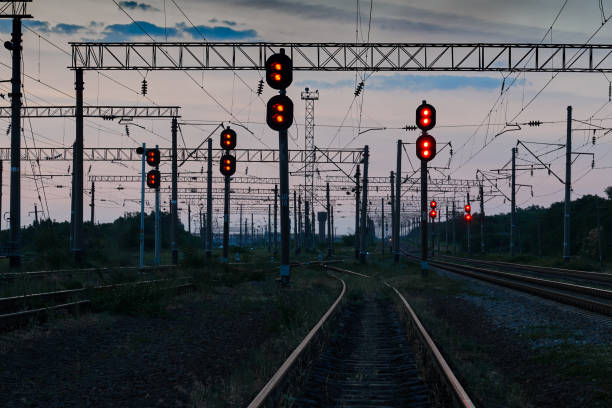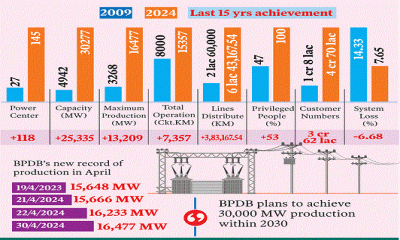Although development projects of Tk thousands of crores have been taken up for construction and renovation of new railway lines, the authorities are not giving much attention to the creation of trained manpower for the safety of passengers and digitization of the railway signal system. As a result, railways in digital Bangladesh run on the British-era analog or 'manual' signal system. According to the Road Safety Foundation, 90 percent of major and minor rail accidents are caused by signal system errors.
Report said that most of the sections of the eastern and western railways of the country are still operating the 'manually' signaling system of the British era. According to public transport experts, head-on collisions between two trains are often due to faulty signals, wrong signals or disregard of signals and negligence of railway drivers and staff. They said that more than 300 passenger trains are plying in the country every day due to faulty signal system with the risk of accidents.
It should be noted that on October 23 last year, 22 people were killed and many passengers injured in a head-on collision between an inter-city Egarosindur Express and a freight train at Bhairab in Kishoreganj. The accident occurred when the freight train entered the station disregarding the signal. In this, the issue of irresponsibility of the driver and related parties came up in the investigation. On April 18, two trains of non-stop service, Porjotok Express and Cox's Bazar Express, survived a head-on collision on the Dhaka-Cox's Bazar route at Patia railway station in Chattogram. Recently two freight trains collided at Ishwardi Junction station in Pabna. Last May 3, several people were seriously injured in a head-on collision between an oil tanker and a passenger train in Gazipur.
Station Master of Bangabandhu Bridge West Railway Station Moniruzzaman said that 7 retired station masters and several pointsmen appointed by Bangabandhu Railway Bridge Project joined the West Station of the bridge on Friday. They were basically coordinating and controlling the line in an analog manner. But station master Khairul Alam and pointsman assigned to the project in charge mistakenly entered line number 5 instead of line number 4.
Public transport experts said, the railway signaling system in neighboring India is operated with modern technology. Nearly 2 lakh kilometers of railways in the country are managed by telecom system. In addition to specific telecom systems in each zone, walkie-talkies are in the hands of the railway police, who are in charge of security, from the locomasters, conductors and technicians of the moving trains. Everyone communicates with the control room by walkie talkie, and the locomaster knows on walkie talkie, in which line his signal is clear. However, no such technology is used in Bangladesh Railways. Trains are operated here manually under signal system through PLC (Paper Line Clear) system. In this system, the station master gives the detailed instructions on a paper to the locomaster on the engine of the train whether the moving train should cross the station ahead or where the train should stop for crossing and at which station the train is scheduled to stop. The loco Master runs the train according to the instructions written on the paper. So the station master is responsible for the wrong signal. And if the signal is violated, the train driver will be responsible.
Saidur Rahman, executive director of Road Safety Foundation, said that rail accidents also happen in India. But in India railway infrastructure is very good, rules are followed so train accident is called accident in that country. But the infrastructure of our railway lines is not good, there are no stones on the lines, the crossings are unguarded, the signals are faulty, the signals are ignored and accidents are caused due to the dereliction of duty of the railway staff. So the railway accident in Bangladesh is basically a structural murder. Because if all the infrastructure is in order, the driver's skill and the railway line are in place, if the accident happens after following all the rules and regulations then it can be called as an unintended accident. But we don't have anything right here—that's why it's called structural murder.
Referring to the least manpower in the signal department, Director General (DG) of Bangladesh Railways Sardar Shahadat Ali said that the present government has launched 160 new trains across the country since 2009 after coming to power. Although the current government has taken the most steps for the development of railways, the development of the signal system has been neglected due to various reasons. It was not possible to modernize the entire signal system. Most of the sections, including Abdullahpur-Parbatipur, Darshana-Khulna and Akhaura-Sylhet, are operated by manual signal system. However, a project to install CBI and CTC signal system in Joydebpur-Ishwari section is in progress. Apart from this, the work of installing modern signal system in the Padma Setu link line construction project including Akhaura-Bhairab section is going on, he said.
He further said that due to manpower shortage, a station which requires an average of 10 to 15 people to run, is run with half the manpower. Railways have to prevent accidents to ensure safe carriage and necessary steps have been taken for this.
ZH






